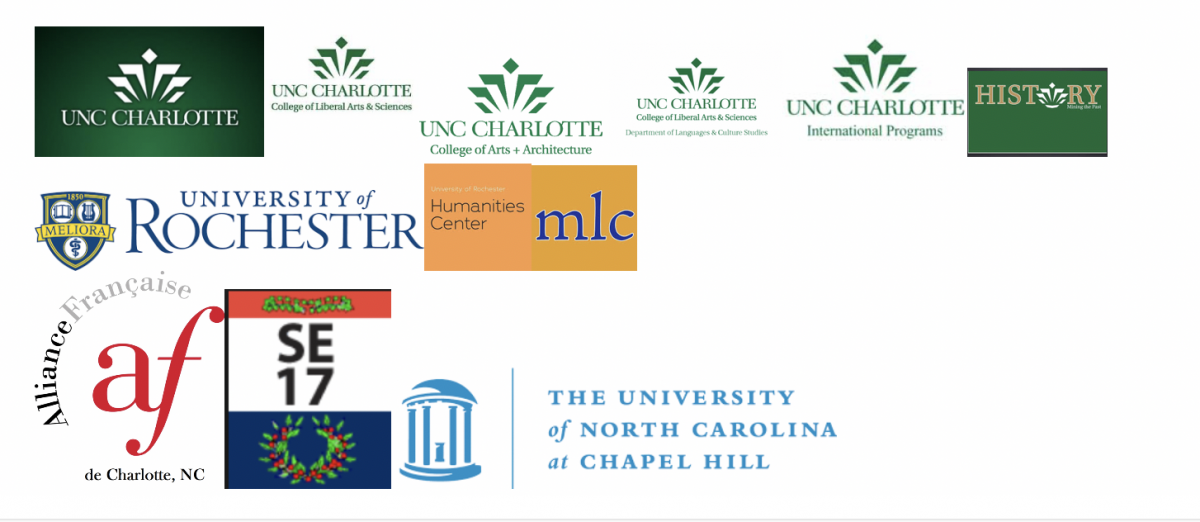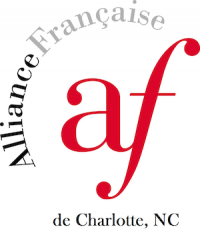(Click here for PDF version)
« Échanges et Intersubjectivité»
Society for Interdisciplinary French 17th-Century Studies
Société d’études pluridisciplinaires du XVIIe siècle
38th Annual Conference Program
October 10-12, 2019
University of North Carolina at Charlotte /
Holiday Inn Charlotte Center City
Thursday, October 10, 2019
Holiday Inn Charlotte Center City
8:30am -5:00pm - Registration (Elevator Landing, 2nd Floor)
8:30am- 9:30am – Breakfast (Mezzanine)
9:00am-11:00am – Workshops (Discovery Ballroom). Group assignments are listed at the end of the program.
11:00am-1:00pm – Lunch
(Executive Committee Lunch, Forchetta Private Dining Room [Street Level, Holiday Inn])
1:15 pm - Welcome and Announcements
1:20pm- 3:00 pm - The Naked and the Clothed / Les nu·e·s et les habillé·e·s (Discovery Ballroom)
Session Chair : Jeffrey N. Peters - Organized by Ellen McClure (U. Illinois, Chicago) and Jeffrey N. Peters (U. Kentucky)
1. Caitlin Dahl (University of Pittsburgh), "Donning Gender: Affect and Temporality in Choisy's Histoire de la Marquise/Marquis de Banneville."
2. Twyla Meding (West Virginia University), “‘Ces secrets de l’escole’: Daphnis Dresses Gender in the ‘Histoire de Diane’ (L’Astrée I, 6)”
3. Jean Leclerc (Western University), “Nu(e) en chemise : exploration d’un syntagme problématique”
4. Lewis Seifert (Brown University), “The Naked Truth? Cross-Dressing and Gendered Embodiment in Iphis et Iante”
Coffee Break (Mezzanine)
3:20pm-5:00pm - Secrets / Les secrets (Discovery Ballroom)
Session Chair: Hélène Bilis - Organized by Hélène Bilis (Wellesley College) and David Harrison (Grinnell College)
1. Esther Van Dyke (University of Chicago), “The Secret of the Religious Sublime in Racine’s Biblical Plays”
2. Helen Harrison (Morgan State University), “Open Secrets: Genre and Identity Politics in Corneille’s Don Sanche d’Aragon”
3. Richard E. Goodkin (University of Wisconsin-Madison), “‘Insurmountably hidden in an impenetrable secret’: The Semiotic Paradox of the Secret in La Princesse de Clèves”
4. Stephen Bold (Boston College), “La Fontaine and the Secret”
5:30-7:30pm - Cocktail Reception (Rooftop, Holiday Inn)
Friday, October 11, 2019
8:20am- 8:50am – Breakfast (Mezzanine / Discovery Ballroom)
8:50am-9:50am - Circuit Session / Séance en circuit
New Directions in 17th-century French Studies / Nouvelles approches du XVIIe siècle – I. (Discovery Ballroom) Session Moderator : Jennifer Row - Organized by Jennifer Row (U. Minnesota, Twin Cities) and Ashley Williard (U. South Carolina)
1. Lisa Kostur (Harvard Univeristy), “Choreographic Subjectivity and Baroque Objects”
2. Geoffrey Turnovsky (University of Washington), ““Reading through the editorial practices of the 18th/19th centuries to today”
3. Ashley Williard (University of South Carolina), “Interrogating Madness in Police Discourse”
4. Christophe Schuwey (Yale University), “Book Marketing in the Classical Age”
Coffee Break (Mezzanine)
10:10am-11:50pm – Simultaneous Sessions
Arts and Architecture / Arts et architecture (Discovery Ballroom)
Session Chair : Abby Zanger - Organized by Benoit Bolduc (New York U.) and Abby Zanger (Independent Scholar)
1. Anna Rosensweig (University of Rochester), “Structures of Sovereignty and the Public Good”
2. Barbara R. Woshinsky (University of Miami), “La Tour abolie: Ruins and Repression in the Classical Era”
3. Jennifer Row (University of Minnesota), “The Invalides and Architectures of Disability”
4. Elizabeth Hyde (Kean University), “(Re)painting the Queen into the Palace of the Sun King”
Death and Mourning / La mort et le deuil – I. (Banquet Room I – Spirit)
Session Chair : Michael Call - Organized by Ann Delehanty (Reed College) and Michael Call (Brigham Young U.)
1. Perry Gethner (Oklahoma State University), “Lyrical Grieving in French Tragic Drama and Opera”
2. John Boitano (Chapman University), “Death and Mourning in Lully and Quinault’s Alceste”
3. Benjamin Fancy (Brown University), “’Je reçois la mort avec joie’: Defying Deathbed Conventions in La Princesse de Clèves”
4. David M. Posner (Loyola University Chicago), “Madame de Sévigné’s Correspondence with Death”
12:00pm – 1:45pm – Workshops and Lunch
(Lunch will be provided for workshop participants in the private dining room of Forchetta, located on the street level of the Holiday Inn. Group assignments are listed at the end of the program.)
1:50pm-3:05 pm - In Style and Out of Style / À la mode et démodé·e (Discovery Ballroom)
Session Chair: Deborah Steinberger - Organized by Ellen Welch (U. North Carolina, Chapel Hill) and Deborah Steinberger (U. Delaware)
1. Cécile Lugand (École des Arts Joailliers), “Jean-Baptiste Tavernier (1605-1689) : une vie de négoce entre l'Europe et l'Asie”
2. Anne Theobald (Hillsdale College), “Keeping Treasures in Style: Editing the Trésors in the 17th Century”
3. Georgia Cowart (Case Western Reserve University), “Pink Pleats, Stripes, and Other Iconoclasms in Watteau's L’Enseigne de Gersaint”
pause
3:20pm – 5:00pm - Death and Mourning / La mort et le deuil – II. (Discovery Ballroom)
Session Chair : Juliette Cherbuliez (U. Minnesota, Twin Cities) (Organized by Ann Delehanty (Reed College) and Michael Call (Brigham Young U.)
1. Benoit Bolduc (New York University), “De quelques portraits posthumes de Madame, ou des vanités de la fête de cour”
2. Carrie F. Klaus (DePauw University), “‘Dame de cent Chasteaux celebre’: The Dowager Princess of Condé and the Politics of Mourning”
3. Francis Assaf (University of Georgia), “Le deuil (?) d’Anne d’Autriche”
4. Arnaud Wydler (Université de Fribourg), “Didactisme ou « autotélisme » ? Les enjeux de la représentation de la mort dans la prédication de Bossuet”
Saturday, October 12, 2019
8:00am- 8:40 am – Breakfast (Mezzanine / Discovery Ballroom)
8:40am – 10:20 am - Conversation / Conversation (Discovery Ballroom)
Session Chair: Geoffrey Turnovsky - Organized by Geoffrey Turnovsky (U. Washington ) and Katherine Ibbett (U. Oxford)
1. Helena Taylor (Univeristy of Exeter), "Marie de Gournay’s conférence: conversation as combat”
2. Kathleen Wine (Dartmouth College), "Books and Conversation in Le Grand Cyrus and Le Roman bourgeois”
3. Dana Nica (Université Alexandru Ioan Cuza, Iaşi, Roumanie / Université de Lorraine, France), "Pascal et ses interlocuteurs étrangers”
4. Radhika Koul (Stanford University), "The Meta-Language of Comparative Aesthetics in French classicism”
Coffee break
10:35am-11:50am - Mixed Session / Séance Mixte
Session Chair : Ellen Welch (U. North Carolina – Chapel Hill)
1. Heather Kirk (Brescia University College), “’Notre sexe est fort vindicatif ‘: les femmes tragiques sous la plume de Tristan L’Hermite”
2. Paul Scott (University of Kansas), “Lascivious Leitmotivs in the Treatises of Abbé Jacques Boileau”
3. Deborah Steinberger (University of Delaware), “The Body as Spectacle: The Uses and Abuses of Autopsy.”
12:00pm – 2:30 pm – Business Lunch (Mezzanine and Discovery Ballroom)
2:45pm – 3:35pm – Pedagogy Session / Séance pédagogique
Session Chair: Sara Wellman - Organized by Edwige Keller-Rahbé (U. Lumière -Lyon-2) and Sara Wellman (U. Mississippi)
1. Theresa Varney Kennedy (Baylor University), “Childrens’ Literature in French: A Window into the Seventeenth Century”
2. Melanie Bowman (Longwood University), “Teaching Censored Works”
(Pause)
3:45pm – 5:00pm - Round Table / Table Ronde : Why Study the French 17th Century ? / Pourquoi étudier le
17ème siècle? Panel Moderators : Michèle Longino and Kate Jensen - Organized by Michèle Longino (Duke University) and Kate Jensen (Louisiana State University)
1. Richard Goodkin (University of Wisconsin-Madison), “Why Study the Seventeenth Century? The Qualitative and the Quantitative”
2. Ellen McClure (University of Illinois-Chicago), “Self and Society in the Seventeenth Century: A Lesson for Today?’’
3. Didier Course (Hood College), “Controverses, scandales et caricatures: la Vème République au risque du Grand Siècle”
4. Filippo Screpanti (Duke University), “The Future of the Grand Siècle: What Will the Study of Seventeenth-Century France Look Like Ten Years from Now?”
7:00 pm – Final Banquet –
Discovery Ballroom (Holiday Inn)
Workshops - Organized by Michael Meere (Wesleyan University) and Anna Rosensweig (University of Rochester)
Group 1 :
Katharina LaPorta (New York University) « Comedy of Erring : Performance in the Underworld in L’Alcoran de Louis XIV (1695) » (chapitre d’un livre)
Matthieu Dupas (Northwestern University), « La comédie galante de Corneille à Molière : galanterie, genre et sexualité dans la France du XVIIe siècle » (chapitre d’un livre)
Jean Luc Robin (The University of Alabama), « Contexte et effet philosophiques du théâtre de Molière » (article)
Christophe Schuwey (Yale University), « Book Marketing in the Classical Age » (projet de livre)
Group 2:
Jiani Fan (Princeton University), « Conversation as a Therapy of Desire : Pascal’s Cosmo-theological Dialogue with a Libertin (fragment Lafuma 201 / Sellier 233) »
Nathalie Freidel (Wilfrid Laurier University), « L’épistolaire, voie d’accès des femmes à l’écriture. Usages et pratiques des épistolières du XVIIe siècle » (projet de livre)
Louise Moulin (Yale University), « La démolition de l’héroïne au tournant de la Fronde » (article)
Sophie Raynard (SUNY Stony Book) et Charlotte Trinquet du Lys (University of Central Florida), « Modern Apprentices : Empowering Fairy Tales from Classic France » (projet de livre)
Group 3 :
Pascale Barthe (University of North Carolina Wilmington), « ‘Vous êtes des fous achevés’ : François Bernier on Fakirs and Sati » (chapitre de livre)
Chloé Hogg (University of Pittsburgh), « Classical Materialism » (projet de livre)
Jennifer Tamas (Rutgers University), « In Spectral Company : Impossible Mourning in Early Modern France » (projet de livre)
Ashley Williard (University of South Carolina), « Black Melancholy in the Early French Atlantic » (article)
********
We would like to thank our generous sponsors:
The University of North Carolina at Charlotte
The Dean of the College of Liberal Arts and Sciences
The Dean of the College of Art and Architecture
The Department of Languages and Culture Studies
The Department of History
The Office of International Programs
The University of North Carolina at Chapel Hill
The Department of Romance Studies
The University of Rochester
The Department of Modern Languages and Cultures
The University of Rochester Humanities Center
The Alliance Française de Charlotte












